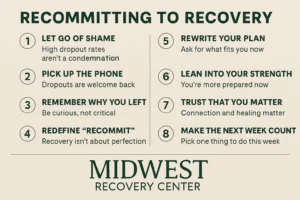Somewhere in the middle of life’s chaos, you stepped away.
You stopped going. Left without telling anyone. Felt like you couldn’t bring yourself to show up.
Maybe you were overwhelmed. Or ashamed. Or burned out on trying.
Whatever the reason, you stopped. And now? Now you’re wondering if coming back matters.
Here’s the truth: It does. More than you may know.
At Midwest Recovery Center in Toledo, we see it often—people who dropped out, got overwhelmed, or silently ghosted IOP.
We also know this: what matters most is what you do next.
Step 1: Let Go of the Shame
First: you’re not a failure for walking away.
High dropout rates aren’t a condemnation—they’re part of human recovery.
Life happens. Survival instincts kick in. Trauma surfaces. Scheduling gets impossible. Feeling seen for your pain takes more courage than we give credit for.
Shame belongs in the narrative—but not as the main character.
If you can’t bring civilian energy into recovery—bring curiosity instead.
Remind yourself: every second chance deserves its place.
Step 2: Pick Up the Phone—Even If It Fears You
The strangest part often isn’t the therapy. It’s the phone call. That voicemail you rehearse 10 ways before hanging up.
Your voice might shake. You might pause. You might be convinced they’ll say no.
They won’t. Dropouts are welcome back more than most people realize.
One call can reopen your file. Reset your calendar. Let your therapist know: I’m not where I was—but I still need help.
And if you’re in or near Maumee or Perrysburg? We’ve built this outpatient care for lives like yours. You don’t need to start from ground zero. You just need to show up.
Step 3: Remember Why You Left—And What You Learned
When you come back, no explanation required. But clarity helps.
Ask yourself:
- Was it the emotional intensity that knocked me off?
- Did scheduling conflicts win?
- Did I relapse and feel unworthy to return?
- Did shame whisper that I didn’t deserve healing?
Be curious about your decision—not critical. Then ask:
What would I do differently now?
What do I need more than before?
Honesty gives you power. Shame steals it.
Step 4: Redefine What “Recommit” Means
It doesn’t have to mean full attendance from Day One.
Recommitment can be:
- One extra group this week
- A single individual session
- A check-in via secure message
- A promise to come back for just one more try
Recovery isn’t about perfection. It’s about persistence.

Step 5: Rewrite Your Recovery Plan, Together
Your first IOP schedule may no longer fit your life. That’s okay.
At Midwest Recovery Center, we tailor plans to work with your rhythm—not against it:
- Evening or weekend groups
- Hybrid sessions (telehealth plus in-person)
- Make-up groups if life happens
- Partnership with your employer if needed
Your brain may have changed. Your life certainly has. Your treatment should too. Ask for what fits you now.
Step 6: Lean Into the Strength You’ve Gained
You walked away once. That takes clarity. Wrestling with life instead of retreating isn’t failure—that’s survival. That means you’re closer to the person who can stay the second time.
Recovery isn’t starting from scratch. You’re more prepared now than before.
Let your return be about building—not beginning.
Step 7: Trust That You’re Still Important Here
We want you back.
Not because you have to get it perfectly.
But because connection matters. Your healing matters.
Walk-ins aren’t judged. You’ll be met. Invited back. Encouraged to try again.
Recovery doesn’t revoke your ticket just because you’re late. It’s patient. Flexible. Waiting for you to step through the door again.
Step 8: Make Your Next 7 Days Count
Pick one thing to do this week. It could be as small as:
- Holding yourself accountable to one group
- Sending one text to your counselor
- Creating a reminder on your phone just to check next week’s schedule
Small actions become anchors in stormy moments.
FAQ: Returning to IOP After Dropping Out
Is it okay to restart even if I relapsed?
Yes. Relapse doesn’t disqualify you. In many cases, it’s why people return—and that insight makes recovery stronger than before.
Do I have to repeat the whole program?
Not necessarily. We assess your time away, current needs, and build a plan that meets where you’re at. For many, adjustments or refreshers work better.
Will they actually welcome me back?
Yes. Recovery clinics see many returnees. You’re not marked as ‘failure’—you’re recognized as someone looking for support again.
Can I return if life looks very different now?
Absolutely. IOP is designed for flexibility. New job hours? New responsibilities? Just say the word—we’ll adjust.
What if I ghost again? Will they care?
They will. If you stop, your clinician will likely check in—not to blame you, but to understand and reconnect. Healing is not one-sided. It’s collaborative.
One Final Word to Your Courage
If you’re still reading—thank you. That means something shifted, even just a bit.
Yes, recommitting to recovery is hard. Yes, it might feel awkward, needy, or even weak.
But here’s the truth: vulnerability isn’t weakness. It’s the doorway. Recovery doesn’t demand you be perfect. It only asks you to choose—for today, for tomorrow—that healing is still worth it. You’re not restarting from the bottom. You’re returning with a map. Living in Maumee, Perrysburg, Oregon, Ohio, or Lambertville, Michigan? Midwest Recovery offers programs built on that same supportive approach.
Ready to recommit? You’re not too late. We’re waiting.
Call (888) 657-0858 to learn more about our IOP services in Toledo, Ohio.


























